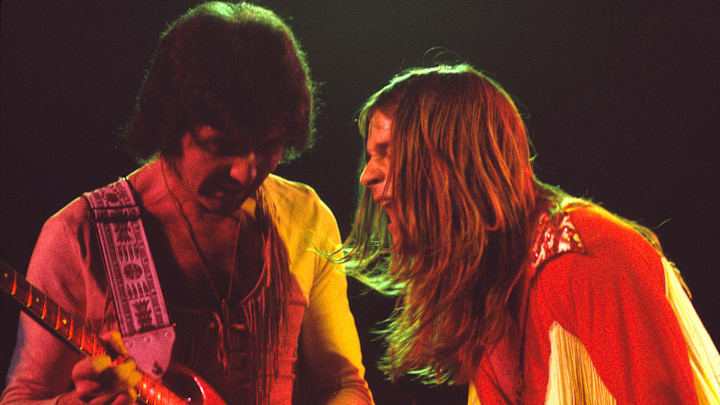The 1970s were a great time to be a kid listening to rock and roll. It was the third generation of rock, but the first one that was ensconced within the genre. The ‘50s were rock’s infancy. The ’60s saw it evolve through adolescence into early adulthood.
Singles gave way to albums – novelty to mainstream. Trace the Beatles’ trajectory, and you know that evolution. They moved from short, up-tempo songs about girls to mature explorations like “A Day in the Life” and side two of Abbey Road in surprisingly short order.
As the genre evolved, it spawned offshoots. Some of them built on what had been done, while others rejected mainstream growth. Metal did both at the same time. It built longer, more elaborate song structures while simultaneously scoffing at some of the intellectual pretense that was seeping into he genre.
Metal was a visceral gut punch. Some of it could be bluesy, while other artists could flirt with classical construction. If it had literary antecedents, they usually came from the world of fantasy or science fiction. The only real requirements were that it be fast, loud, and aggressive. And, at least throughout the ‘70s, it was male-oriented.
5 iconic metal songs that shaped a decade of hard rock
These are the songs that helped shape metal from its early days. By the following decade, it would be one of the biggest-selling musical forms in the world. Its proponents rarely got critical plaudits. Based on the arbiters of prestige, such as the Grammys and the Rock and Roll Hall of Fame, they are still not receiving the acclaim they deserve.
But their millions of fans would rather spend an evening cranking ear-bleeding metal than listening to pretty much anything that even hints at mellow.
“Paranoid” by Black Sabbath (1970)
And speaking of mellow... Ozzy and the boys helped put metal on the map with this massive hit, pretty much everywhere but the USA. It did at least chart in the States, even if it didn’t perform nearly as well as it did throughout Europe and Australia. In the USA, many teenage bands learned to play it. Badly, for the most part.
We learned that it was usually because the bass player couldn’t do what Geezer Butler could do. And so, in a very real way, “Paranoid” taught us all that the bass matters.
“Rock and Roll” by Led Zeppelin (1971)
I know. This spot is supposed to go to “Stairway to Heaven. It was ubiquitous. It came to define a band and an entire style of music. “Stairway’ still finishes at the top of many holiday countdowns on classic rock stations. I’m not choosing it because it’s been written about to death. Besides, I think there were better songs on Zeppelin’s fourth album – the one usually referred to as Led Zeppelin IV.
Technically, “Rock and Roll,” which also appeared on the album, was a bigger hit in the USA, but that’s just due to a quirk of release history. “Stairway” wasn’t released as a single in the States. “Rock and Roll” is a blast of pure rock elation. All four members of the band are in gear.
Beginning with John Bonham’s cymbal-driven groove and John Paul Jones’ thumping bass, through Jimmy Page’s iconic riffs and solos, and Robert Plant’s effervescent vocals, everyone is at their best. And in the second half, they even toss in some hard-charging piano, courtesy of the seminal Rolling Stones’ keyboardist Ian Stewart.
If you’re going to title your song “Rock and Roll,” you’d best know what you are doing.
“Smoke on the Water” by Deep Purple (1972)
Let’s keep this one simple. The song that crossed over from metal to pop. And it had the most iconic opening guitar riff of the decade – maybe of all time. It was initially released in 1972, though it didn’t become a hit as a single until the following year.
“Highway to Hell” by AC/DC (1979)
Late in the decade, when something called new wave was beginning to demand attention, you could still find an edgy brand of flat-out hard rock. The best new proponent of it came from Australia. Though they had scored several hits at home, “Highway to Hell,” from the album of the same name, was what broke them in the USA.
The crunching rhythm guitar of Malcolm Young sets up the drunken, demonic vocals of Bon Scott. Eventually, Malcolm’s brother Angus starts filling in the song with his guitar riffs. The song went platinum. The album yielded several other major hits and set the stage for AC/DC's long-term success.
Sadly, that would come without Scott, who died of acute alcohol poisoning six months after Highway to Hell was released.
“Overkill” by Motorhead (1979)
We opened with Black Sabbath’s seminal metal classic “Paranoid” from 1970. There was plenty of other quality metal throughout the decade, but I’m closing with the most egregious omission from the Rock & Roll Hall of Fame, Motorhead.
Lemmy Kilmister was metal. A brilliant songwriter, an outstanding bass player, and a serviceable singer, he assembled a trio that blew the doors off any room they were in. Fast Eddie Clarke and Philthy Animal Phil Taylor on guitar and drums respectively, played with a melodic ferocity that has rarely been matched in the decades that followed.
Metal, it turns out, was warming up. John Banham’s death would curtail Led Zeppelin’s career, but the other bands would keep cranking out loud, fast music for decades to come. The most significant metal act of all time was just about to start up in L.A., and a couple of dozen sub-genres were germinating. They essentially all grew out of the seeds planted in the 1970s.
